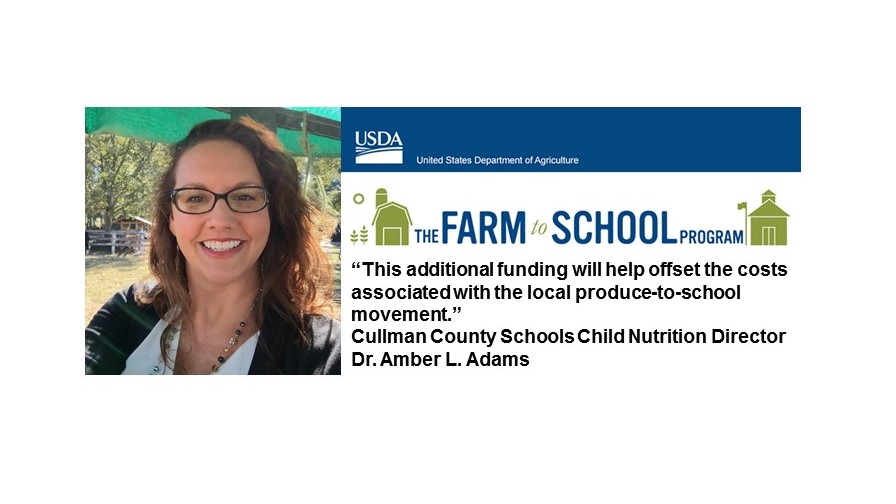I had never realized what a gem Cullman County was in terms of agriculture, and I began to wonder why we weren’t doing any farm-to-school activities.”Dr. Amber L. Adams
CULLMAN – Last month, the Food Bank of North Alabama (FBNA) and partners were one of 21 projects in the nation to win a U.S. Department of Agriculture Farm-to-School Program grant. The food bank and partners were awarded $100,000, the highest award possible, which will fund a statewide Farm-To-School initiative. Cullman County Schools is one of five school districts in the state that collaborated to make the grant a reality.
According to a release from the FBNA, the statewide Farm-To-School initiative is made possible by “an unprecedented collaboration among the Alabama Department of Education, Alabama Department of Agriculture & Industries, Food Bank of North Alabama, Alabama Cooperative Extension, Cornell University, Alabama Farmers Federation, TotalCom, a Huntsville marketing firm, and five leading school districts including Madison County Schools, Madison City Schools, Huntsville City Schools, Cullman County Schools and Birmingham City Schools.”
Cullman County Schools Child Nutrition Director Dr. Amber L. Adams was the catalyst behind the school system’s involvement in the program.
Since Adams came on board as child nutrition director in June 2015, county school lunches have undergone some interesting changes. For one, those old cardboard milk boxes are a thing of the past; now students drink their milk, available in white, chocolate and strawberry flavors, from small plastic “chugs” that fit perfectly in their hands. From time to time, special guests are invited to sit down and eat with students, especially during events such as “Bring a Friend to Lunch Day,” “Honoring Local Farmer Day” and “Dr. Seuss Day.” But the biggest change is that students across the county are now eating fresh fruits and vegetables grown right here in Cullman County.
“One of the things I really enjoy about my job, although it’s not something I have to do, is working with Tony Glover with the Cullman County Extension Office,” said Adams. “I had never realized what a gem Cullman County was in terms of agriculture, and I began to wonder why we weren’t doing any farm-to-school activities. Again, this is something I don’t have to do; it’s just something I am interested in and this is the perfect place to do it,” she smiled.
“When I came to Cullman last year, the schools were already getting some of their sweet potatoes from a local grower,” she explained. "I partnered up with the Food Bank of North Alabama, Cullman Caring for Kids, the County Extension Office and local organizations that represent Cullman County farmers to expand our current outreach efforts because we are all in this together. At the end of the day, I'm trying to feed as many hungry kids as possible, and that is what they are trying to do as well."
With the help of the FBNA and Cullman Caring for Kids, Adams soon began meeting with local farmers, finding out what they grow and where they are located. Once all of the information was gathered, Adams began to pair local farmers with the schools closest to them. Now, homegrown sweet potatoes and other fresh produce are delivered to the schools on a regular basis.
The $100,000 USDA Farm-to-School Program Grant is only awarded to one organization per state, and was awarded to the FBNA and its partners. It will allow the food bank to increase the volume and diversity of locally grown produce served in over 1,500 school cafeterias and 13 summer feeding programs.
“This pioneering farm-to-school initiative gives Alabama school children access to fresh, healthy food choices and creates economic opportunities for family farmers,” says Frank Speed, administrator of the Food Distribution Program for the Child Nutrition Programs at the Alabama State Department of Education.
The partners, including Cullman County Schools, will use the funds to connect schools with local farmers and promote healthy, locally-grown fruits and vegetables in school cafeterias across the state. The project’s aim is to help the state address serious public health issues while fostering economic development. In Alabama one in three children (ages 10-17) are overweight or obese. At the same time, the state has lost over 2,000 farms in five years according to the latest U.S. Census of Agriculture.
“This award is a win for local farmers and a win for Alabama children,” said Kathryn Strickland, executive director of the FBNA. “It will enable us to support local farmers with our food purchases and at the same time promote healthy eating in schools.”
“Farm-to-school programs work—for schools, for producers and for communities,” said U.S. Secretary of Agriculture Tom Vilsack. “By serving nutritious and locally-grown foods, engaging students in hands-on lessons and involving parents and community members, these programs provide children with a holistic experience that sets them up for a lifetime of healthy eating.”
"I feel so honored to be a partner with the Food Bank of North Alabama in this endeavor and am grateful for the opportunity to expand Cullman County's current farm-to-school initiatives! One of the hardest things about offering more fresh fruits and veggies in a school nutrition program is the cost,” said Adams. “This additional funding will help offset the costs associated with the local produce-to-school movement. I think the local farmers are happy with the current farm-to-school outreach that has been extended to them, and this should only excite them further."
Adams attended Wallace State Community College after graduating from Arab High School. She transferred to Jacksonville State University where she earned her Bachelor of Science degree in nutrition and dietetics. She continued her education and earned both her master’s in public health and doctorate in community health education from Walden University.
Before coming to Cullman, Adams worked at the Alabama State Department of Education Child Nutrition Program as education administrator. Before that, she worked with the U.S. Food & Drug Administration (FDA) and taught health and wellness as an adjunct instructor at Middle Tennessee State University. She served as a Child Nutrition Program Director in Calhoun County and worked with the Sodexho Marriott Corporation, as well as a private caterer, in Anniston.
To learn more about the USDA Farm-to-School Grant Program, visit http://www.fns.usda.gov/farmtoschool/farm-school-grant-program.


























